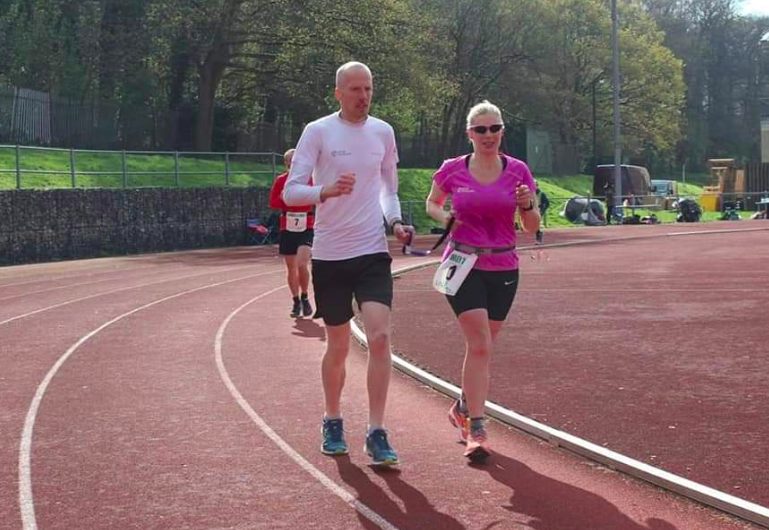Blind ultrarunner wins legal challenge to run at 24-Hour World Championships
The IAU said that Sinead Kane couldn't run with a sighted guide, so she took them to court

Just in time for this weekend’s 24-Hour World Championships in Albi, France, visually impaired runner Sinéad Kane, 37, of Youghal, Ireland has won her battle against the IAU (International Association of Ultrarunners) over its refusal to let her run as a member of Team Ireland with a sighted guide. The Monaco-based IAU announced a change in position late this afternoon.
I WON my discrimination fight against IAU. I'm GOING. I'm flying out with Irish team in the morning. Thank you so much to @RichardDonovan7 and my legal team @KODLyons for getting this win against an international sporting body!! #disability #running #law pic.twitter.com/oCFEvXxxff
— Dr. Sinead Kane (@KaneSinead) October 23, 2019
At one point during legal proceedings, the IAU said that Kane could run simultaneously with the athletes racing the championship, but that it would not list her in the results. “It’s like a textbook definition of discrimination/exclusion, but yet they are trying to mask it as including her,” Richard Donovan, race director of the World Marathon Challenge (which Kane completed in 2017) and former head of the IAU, told us in an email on October 17. “It’s apparent there is no advantage to having a visual guide in a 24-hour race and there are no health and safety issues, or they wouldn’t advise that she can run alongside the Championship athletes.”
https://www.instagram.com/p/B3Ih59undBT/
RELATED: Visually impaired Irish runner one marathon away from making history
Further, Donovan points out that the IAU has no problem with bending the IAAF rules when it comes to the use of earbuds on the course, which it allows in the 24-hour world championship (but which is prohibited in IAAF track races).
Legal challenge against operation of IAU 24 Hour World Champs next week due to IAU’s continuing insistence on not allowing a blind athlete take part. @KaneSinead met the qualifying distance of sighted athletes. #discrimination #ultrarunning @iaunews @irishathletics @soniaagrith
— Richard Donovan (@RichardDonovan7) October 15, 2019
Kane, a lawyer, mediator, Ph.D. and accomplished ultrarunner and two-time Guinness World Record holder, ran 204.5K at the Crawley AIM 24-hour event in Birmingham, UK in April to qualify for the world championships (finishing as second female and sixth overall), but was not selected for the Irish team because of the IAAF rule governing illegal assistance. (The IAU operates under the umbrella of the IAAF and follows IAAF rules. Rule 144 states that athletes may not receive verbal or physical assistance from another person in the competition area.) Kane has competed in numerous IAU events, none of which classified her results separately on account of her running while tethered to a sighted guide.
Donovan told us that Kane fought the issue on the basis of human rights, and that the case was filed in Monaco, where the IAU is headquartered. On October 17 he pointed out that “There are international equality/anti-discrimination laws, including in France where the event takes place. Maybe the operation of the event itself could be placed in jeopardy if this discrimination continues beyond tomorrow.”
https://www.instagram.com/p/BwTz2o8HRFZ/
According to Donovan, Kane’s performance at Crawley ranked her as 36th best female in the world in 2019 and third in Ireland.
Kane is classified as T12 Paralympic, and as such, she is entitled to run with a guide, whose assistance is not considered in any way performance-enhancing or illegal under Paralympic rules.
In 2017 Kane became the first blind person to run a marathon on all seven continents in a seven-day period. She also holds the female world record for 12-hour treadmill running (103.5 kilometres).
Like the IAAF World Championships, the 24-Hour World Championships takes place every two years. (The 2017 event was held in Belfast.) The 2019 event will see 153 women and 210 men from 45 countries compete on a 400m track, running as far as they can in a 24-hour period. Canada is sending six male and six female athletes to the event, including Sebastien Roulier, Blaine Penny and Natalie Shanahan. The US has 18 athletes in contention, including 24-hour world record-holder Camille Herron and 2019 UTMB winner Courtney Dauwalter.


